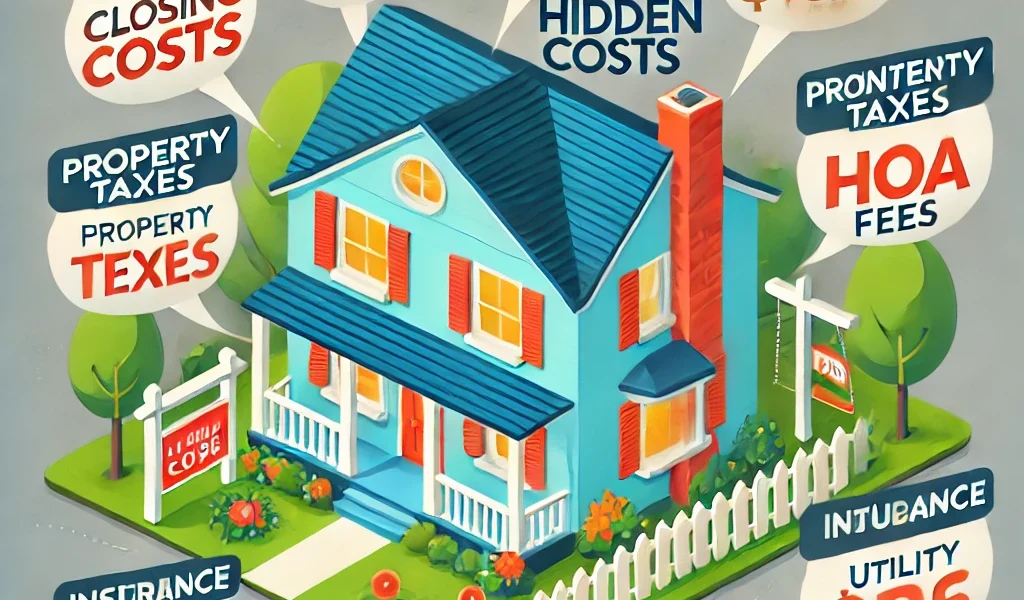Investing in real estate is an exciting and potentially lucrative venture, but it comes with more costs than just the price tag of the property. Many first-time buyers and even experienced investors often overlook hidden costs that can significantly impact their budget. Understanding these hidden costs can help you make more informed decisions, avoid financial pitfalls, and ensure a successful real estate investment. This DIY guide explores the various hidden expenses in real estate and how to prepare for them.
1. Closing Costs
Closing costs are the fees and expenses you pay when finalizing a real estate transaction. These costs typically range between 2% and 5% of the property’s purchase price. Some key components of closing costs include:
- Loan Origination Fees: Charged by lenders for processing your mortgage application.
- Appraisal Fees: Required by lenders to determine the market value of the property.
- Title Insurance: Protects against claims that could challenge your property ownership.
- Attorney Fees: If your state requires legal representation during closing.
- Escrow Fees: Charged by escrow companies for handling the transaction securely.
- Recording Fees: Paid to local governments to register the property under your name.
2. Property Taxes
Many buyers underestimate the impact of property taxes, which vary based on location and property value. These taxes can change over time due to property reassessments, local government decisions, or infrastructure developments in the area. Before purchasing, research local tax rates and assess their long-term financial impact.
3. Homeowners Association (HOA) Fees
If you purchase property in a community with a Homeowners Association (HOA), you’ll likely have to pay monthly or annual fees. These fees cover amenities, landscaping, security, and maintenance of shared spaces. HOAs may also impose special assessments for major community projects, which can be costly.
4. Maintenance and Repairs
Owning real estate means ongoing maintenance costs. Common expenses include:
- Routine Maintenance: HVAC servicing, plumbing repairs, landscaping, and pest control.
- Emergency Repairs: Roof leaks, electrical issues, or structural problems.
- Long-term Upkeep: Replacing appliances, repainting, or upgrading home systems.
Creating an emergency fund for unexpected repairs can prevent financial strain.
5. Utility Costs
New homeowners often overlook utility expenses, which include:
- Electricity
- Water and sewer charges
- Gas
- Trash collection
- Internet and cable services
These costs vary based on location, usage, and property size. Request past utility bills from the seller to estimate future expenses.
6. Insurance Premiums
Beyond standard homeowners insurance, additional coverage might be necessary:
- Flood Insurance: Required in flood-prone areas.
- Earthquake Insurance: Needed in seismic regions.
- Umbrella Insurance: Provides extra liability protection.
Shop around for competitive insurance rates to avoid overpaying.
7. Vacancy Costs
If you’re buying real estate for investment purposes, vacancies can be costly. A vacant rental property still requires mortgage payments, property taxes, and maintenance. Budget for potential vacancies to ensure you can cover expenses even when the property isn’t generating income.
8. Legal and Permit Fees
Real estate transactions may require legal guidance, zoning permits, or renovation permits. Examples include:
- Legal Review of Contracts
- Zoning Applications for Property Modifications
- Building Permits for Renovations or Extensions
Consult with local authorities to understand regulatory requirements and associated costs.
9. Property Management Fees
If you own rental property but don’t want to manage it yourself, hiring a property management company is an added cost. These companies handle tenant screening, rent collection, maintenance, and legal issues. Property management fees typically range from 8% to 12% of the monthly rental income.
10. Opportunity Costs
Tying up funds in real estate means you may miss other investment opportunities. Consider:
- Alternative investments with higher liquidity.
- The time it takes to realize profits from real estate.
- Market fluctuations affecting property value.
Ensure your investment strategy aligns with your financial goals.
How to Mitigate Hidden Costs
- Conduct Thorough Due Diligence: Research all associated costs before purchasing.
- Negotiate Closing Costs: Some fees can be negotiated with the seller or lender.
- Budget for Emergencies: Keep a reserve fund for unexpected expenses.
- Understand Local Regulations: Avoid fines or legal issues by staying compliant.
- Invest in a Home Inspection: Identify potential problems before purchasing.
- Work with Experienced Professionals: Consult with real estate agents, attorneys, and financial advisors.
Final Thoughts
Real estate investments can be highly rewarding, but hidden costs can make or break your financial plans. By understanding these expenses and preparing for them, you can make smarter investment decisions and protect yourself from unexpected financial burdens. Always approach real estate transactions with careful research, financial planning, and expert advice to ensure a smooth and profitable experience.




